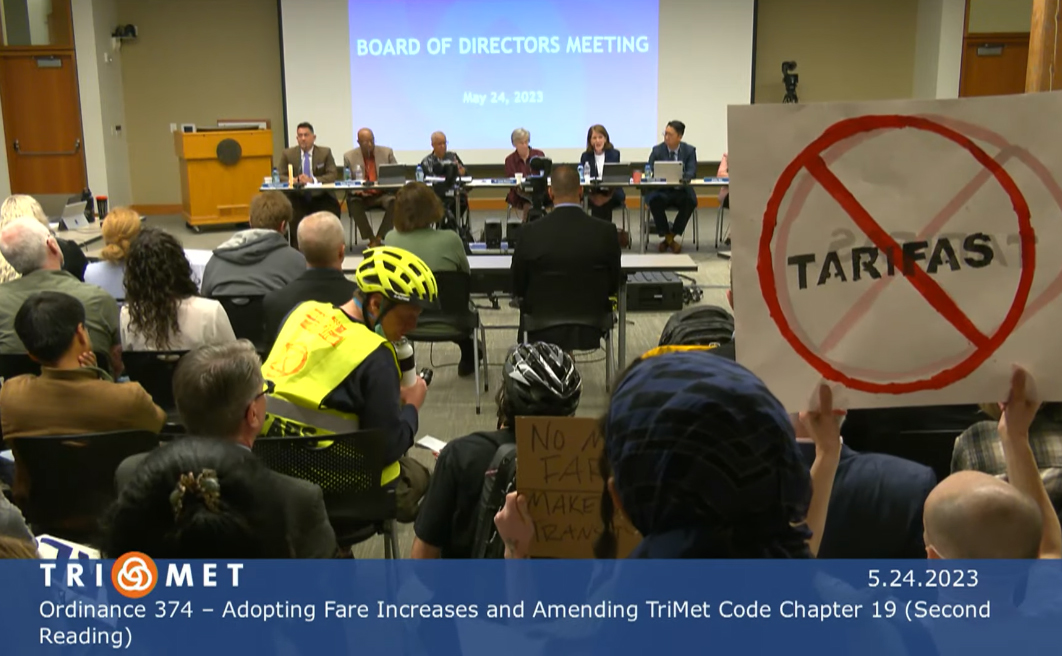
In this screenshot of live video, the TriMet board of directors meets Wednesday, May 24, 2023, in Portland, Ore. The board voted to increase single-use fares after loud protest from opponents.
Video Still / TriMet
The TriMet board of directors voted 6-1 Wednesday to increase single-use fares for its Portland-area busses and trains.
The vote came after loud protest from attendees that led the board to move from a public meeting to a virtual one.
The new rates increase the cost of a typical two-and-a-half-hour trip using TriMet by 30 cents to $2.80. The new rates take effect Jan. 1, 2024. TriMet’s monthly and annual rates remain unchanged, including the monthly cap of $100 for adults who purchase daily fares through TriMet’s app.
TriMet staff first proposed increasing fares to the board in November. They said without this increase, the agency could run a budget deficit by 2026. Maintenance and transportation costs have increased, according to a report delivered to the board Wednesday, and the agency hasn’t raised fares since 2015.
The higher fares will bring in an estimated $4.9 million in annual revenue starting next year, the report says.

FILE - A person rides the MAX light rail Red Line train through downtown Portland, Ore., Thursday, April 29, 2020. Mass transit ridership decreased during the COVID-19 pandemic.
Bradley W. Parks / OPB
The number of people using public transportation plummeted during the pandemic, and the agency has yet to recover. TriMet in recent years has also struggled with a historic labor shortage, which has delayed many routes and contributed to reduced ridership.
TriMet estimates that ridership is down 50% compared to 2020, according to its 2024 budget. The agency expects ridership to increase by 50% between 2022 and 2026, but it doesn’t go into detail explaining the optimistic projection.
Most speakers at Wednesday’s meeting opposed the fare increase, saying it would unfairly impact low-income riders who rely on daily rates. Some opponents said the agency should consider adjusting tax and advertising revenues to avoid the increase, or eliminate fares entirely.
Oregon Rep. Khanh Pham, a Democrat who represents District 46 in outer Southeast Portland, opposed the fare increase, saying it would harm her financially vulnerable constituents who need public transportation.
“This fare increase appears to be a temporary budget Band-Aid that ultimately hides the larger systemic problems that TriMet must begin to tackle to be a transit agency of the 21st century,” Pham testified. “TriMet needs to move away from its reliance on fare revenue to close funding gaps and move towards thinking about transportation like an essential service and funding it accordingly.”
In reports presented to the board, TriMet staff said fare revenue is “a key element of TriMet’s financial plan.” In 2022, the agency generated $49.2 million from fares — about 7% of its revenue — and $463.5 from a transit payroll tax over Multnomah, Washington and Clackamas counties, according to TriMet’s 2024 approved budget. The agency also received $241.4 million from federal grants, which are expected to decrease significantly in years to come — by more than $100 million annually — as pandemic emergency aid expires.
Board member Kathy Wai, who represents Clackamas County, had the lone vote against the fare increase. Wai called the board’s vote on the proposal “premature,” given that TriMet recently created a fare subsidy work group to asses alternative financing beyond fares.
Wai added that she thought the fare increase would ultimately harm TriMet’s already lackluster ridership numbers and “dismal” performance reviews.
“It’s really sad,” Wai said. “People really aren’t riding transit as much as they were back in the days. And it’s due to affordability. It’s due to so many different reasons.”
Board member Thomas Kim said he agreed with Pham’s description of the fare increase as a “Band-Aid.”
“But the current, urgent financial reality is, until we can treat the funding issue, we do need that Band-Aid,” Kim said. “While I will vote today to ensure TriMet’s continued existence and TriMet’s service level, I assure you, that we would not be wearing the Band-Aid forever.”
Many critics suggested TriMet increase the payroll tax instead of fares. Employers and entrepreneurs pay the payroll tax, which is calculated as less than 1% of their gross payroll, for services performed within the TriMet Transit District.
Related: Oregon DEQ may expand a Portland program that encourages alternative commutes 🚉
Proponents of cutting fares entirely, including Portland State University urban studies professor Aaron Golub, say increasing that tax is a small price for employers to collectively pay to encourage more people to use public transportation.
“Especially downtown Portland, central Beaverton — those areas would be very congested if it weren’t for the MAX [light rail] and bus,” Golub told OPB. “Even drivers benefit when others are taking transit. I think zooming out and having a bigger bedrock of funding from a more general collection makes more sense.”
Golub compared it to homeowners partly paying for roads and bridges through property taxes: “We don’t ask drivers to pay each time they go out and drive their car.”
Roads and bridges in Oregon are also funded by a gasoline tax of 38 cents per gallon.
Golub is also on the board of directors for OPAL Environmental Justice Oregon, an advocacy group that supports getting rid of fares. The group organized a rally in downtown Portland Wednesday morning.
Since December, TriMet collected feedback on the fare increase from community events, meetings with community organizations and an online survey. Of the 5,688 respondents to the survey, 43% said they would take fewer trips as a result of it.
